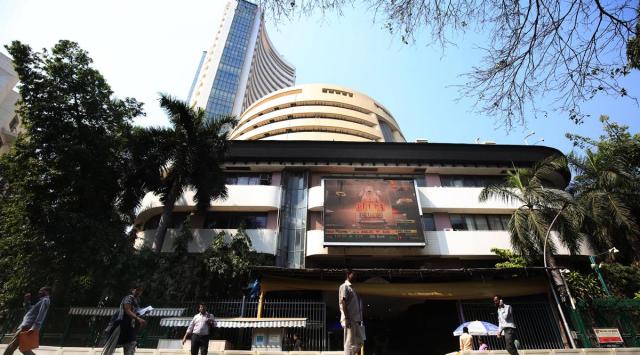- India
- International
Sensex races from 50,000 to 60,000 in eight months
The benchmark index at the Bombay Stock Exchange hit a high of 60,333 before closing at 60,048, a gain of 163 points. The broader Nifty at the National Stock Exchange rose 30 points to 17,853.2.
 BSE (Express Photo by Amit Chakravarty)
BSE (Express Photo by Amit Chakravarty)Riding on hopes of a pick-up in consumption-led growth, and enthused by faster vaccinations and the possibility of a mild third wave of Covid, if at all, the Sensex breached the 60,000 mark on Friday — continuing the strong rally of the past two months.
The benchmark index at the Bombay Stock Exchange hit a high of 60,333 before closing at 60,048, a gain of 163 points. The broader Nifty at the National Stock Exchange rose 30 points to 17,853.2.
While the Sensex has risen from 50,000 to 60,000 over eight months — with retail investors, mutual funds, and foreign portfolio investors leading a sustained stock market rally as the economy recovered from the ravages of the pandemic — the bull run has been especially aggressive over the last two months.
Between August 1 and September 24 when it crossed 60,000, the Sensex has risen 7,462 points, or 14.2 per cent. Besides the pick-up in vaccinations and hope of an economic revival, the rally during this period has been helped by statements that the United States Federal Reserve has made.
In its statement issued at the end of July, the American central bank delinked the tapering of its bond purchase programme from the cycle of interest rate hikes. And on Wednesday, the Federal Open Market Committee (FOMC) said that it would maintain an accommodative monetary policy stance until the targets for inflation and employment were met.

The announcements allayed investor fears of a sudden and sharp withdrawal of the Fed’s bond purchase programme, followed by a hike in interest rates. They have provided comfort that while the tapering will be spread until mid-2022, interest rates will begin to rise only towards the end of next year — which means there will be no sudden exits by FPIs.
In fact, the sharp rise in the Sensex over the last two days has come on the back of the Fed’s announcement on Wednesday. Sentiments also improved as concerns waned over a possible default on debt repayment by the Chinese real estate behemoth Evergrande.
Ashishkumar Chauhan, MD & CEO, BSE, said, “The Sensex reaching 60,000 for the first time is an indicator of India’s growth potential, as well as of the way India is emerging as a world leader during the Covid period, in addition to the monetary expansion and relaxed fiscal policies adopted by world powers.”
Indian markets are considered the world’s best performing over the last 18 months, as the government and Reserve Bank of India have unleashed a host of policy packages, and pumped liquidity into the system.
“More investors are joining the stock markets directly or indirectly through mutual funds, thanks to automation in the markets, new-age brokerages, and low interest rates in India. The increase in stock prices has been broad-based in the recent period,” Chauhan said.
However, with indices hitting new peaks on an almost daily basis, market experts have cautioned investors about stretched valuations. Market participants should be wary of rising inflation and the resulting removal of liquidity from the system, and unwinding of the accommodative monetary policy by the RBI, they have said.
In the current calendar year, some central banks — in Russia, Korea, and Ukraine, for example — have raised interest rates. “Rising inflation risk and withdrawal of ultra-easy monetary policy by global central banks (mainly the Fed) may trigger a rise in bond yields, which can cause risk assets to correct sharply. One can remain invested with a vigilant eye on the movement in yields the world over, which can result in a sharp 10%-15% correction from current levels,” Piyush Garg, CIO, ICICI Securities Ltd, said.
“With the depth of the damage which may be caused by Evergrande still not clear, and some economic numbers from the US likely to be released, the markets may witness some volatility during the course of the next week, and also some profit-booking,” Garg said.
“We believe that the interest of foreign investors in Indian markets will sustain due to continued policy support from the government and accelerated pace of vaccination, offering incremental growth visibility. India’s average daily vaccination rate in September has seen a 48% jump to 8.1 million doses compared to 5.4 million doses in August. This augurs well for the economy as well as investor sentiment,” said Hemant Kanawala, Head, Equity, Kotak Mahindra Life Insurance.
Going forward, “inflation, unwinding of the monetary policy, growth prospects and global cues will dictate the market movement,” BSE dealer Pawan Dharnidharka said. “Retail investors should be cautious. They should not run after high-priced stocks.”
Best of Express
Apr 18: Latest News
- 01
- 02
- 03
- 04
- 05






































